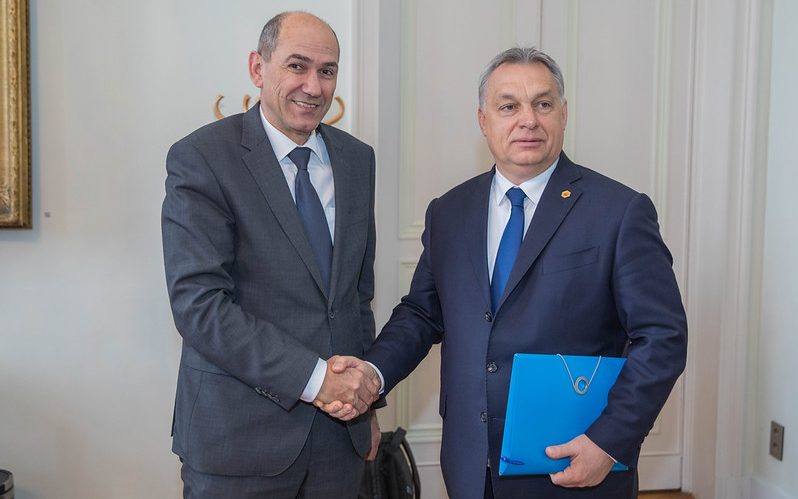Foreign investments into private and state companies are nothing new in the 21st century – it is a crucial part of the business lifespan and happens when corporations grow large enough to acquire new products, open new branches, and generally enter new potentially profitable markets. Its origins lay in the process of globalization which is one of the most important values of the European Union. However, when a government (and CEOs with deep ties to government officials) in a poor democratic standing starts massively investing into the critical infrastructure of another country, one can be justifiably concerned about whether these investments have a hidden agenda. This is even more important to recognize when a country is trying to gain influence in a political landscape – and especially concerning when this influence is endangering the future of a beneficial alliance.
To explore this issue more thoroughly, let us take a closer look at the situation in Slovenia.
Banking
In 2019, a bank called SKB, owned by the French Société Générale group since 2001, suddenly fell into OTP’s hands which has completed many acquisitions and became a dominant bank in the Central European region. For those unfamiliar, the CEO of OTP is Sándor Csányi, a Hungarian billionaire with close ties to Hungarian prime minister Viktor Orbán who reportedly even visited Csányi’s private island in the Adriatic Sea (Eszter, 2019). Even more so, it looks like his acquaintance enables Orbán, who is a passionate football fan, to fly to various matches in an OTP-owned private jet that identifies itself as a Hungarian governmental plane. Because Orbán did not disclose these trips as gifts, the opposition party Demokratikus Koalíció initiated proceedings against him that ultimately failed. In the end, even if these flights were not a gift to Orbán then the government must have rented the plane, which means thousands of taxpayer money have already been spent on luxurious trips for his personal satisfaction (XpatLoop.com, 2018).
In May of this year, OTP successfully bought another Slovenian bank Nova KBM, which already merged with another domestic bank Abanka a short time before. This means that OTP is now the biggest banking entity, controlling over 20,5% of the banking sector, and is even bigger than the state-owned NLB bank (Hadner Hvala, 2021).
Media
Hungarian investments into Slovenian media range all the way back to 2017, when Ridikul, Ripost and Modern Media Group from Budapest invested into Nova24TV, a newly established TV station co-owned by members of the Slovenian Democratic Party (SDS) and headed by Slovenian prime minister Janez Janša, one of Orbán’s main political allies in the Central European region. The investment was reportedly supported by Karoly Varga, the CEO of a construction company winning major construction contracts given by the Hungarian government (Kučić et al., 2020). Ever since its inception, Nova24TV has been famous for its strong support of the SDS party, praising the work of the soon-to-be Slovenian PM Janša, and ignoring many corruption scandals and similar issues faced by the far-right government coalition.
Following the deal in 2017, Peter Schatz, the co-founder of the pro-government tabloid Ripost and a key lead in the expansion of pro-Hungarian media abroad (Delić et al., 2020), also acquired a majority stake in Nova obzorja, the publisher of Demokracija, another biased political weekly co-owned by SDS (Kučić et al., 2020).
The newest addition to Orbán’s media network is Planet TV which was acquired by the Hungarian media group TV2, a pro-government media, loyal to the Fidesz party, who bought it from Telekom Slovenija, a state-owned telecommunications company. It was TV2 that launched smear campaigns against Orbán’s political opponents during the election campaign, and even openly vowed support during a live broadcast for which it was later fined by the Hungarian media authority. The current owner of the TV2 is the investment fund Abraham Goldman, owned by József Vida, a 45-year old businessman and a new rising star of the Fidesz elite (Intellinews.com, 2021). He has close ties and business partnerships with the biggest Hungarian oligarch Lőrinc Mészáros, Orbán’s good friend from childhood. He has an estimated wealth of 900 million EUR, has businesses in all sectors of the economy and is a regular winner of countless public tenders which are often funded by the EU (Horn, 2020). Similarly as the previously mentioned Varga and Schatz, both are known to be key members of Orbán’s vast business network.
At the beginning of this year, Telekom Slovenija also planned to sell its 100% share of TSmedia, a firm managing three news portals Siol.net, Najdi.si and Bizi.si. In May, the supervisory board of Telekom Slovenija agreed to suddenly stop the sell TSmedia, and based on unofficial reports, the best offer was reportedly given by United Media which already owns news outlets that are highly critical of Janez Janša and the SDS party. Dr Marko Milosavljević, a professor at the Faculty of Social Sciences at the University of Ljubljana, argues that this was a politically motivated decision that came as a result of the SDS party’s abuse of the company for political purposes. Another hint of company mismanagement is the fact that Telekom’s leadership decided to promote the SDS-linked Nova24TV channel and put it higher up on the channel recommendation section despite having no positive viewership data to support such a decision (Gole, 2021).
Infrastructure
Just as investments in other sectors, Hungary has never been hiding its ambitions of publicly investing in Slovenian infrastructure projects.
2TDK
One of them is the building of a second railway track between Divača and Koper which is aimed to eliminate traffic congestion on the Trans-European Transport Network (TEN-T) and would greatly benefit the Slovenian Port of Koper. The current track, built in 1967, is severely outdated but still receives 70% of freight from Koper to Divača and 30% in the opposite direction (Railway-technology.com, n.d.).
Despite the length of the track being only 27 kilometres long, the country established a state-owned company 2TDK in March 2016 to lead the necessary activities. The government was able to secure EU funds, however, after the emergence of Hungarian involvement in the project, criticism about the deal significantly benefiting Orbán started to emerge. As explained by sources, preconditions made by the government about the justification of Hungarian involvement never really existed which caused a big outcry that eventually led to a referendum about the entire infrastructure project. Despite the referendum failing, a new government was sworn in later in autumn and the first measure of the new minister of infrastructure was to change the direction of the project without Hungary’s involvement (Motoh, 2019).
However, under the newest government lead by the previously mentioned PM Janša, a friend of Orbán, the attitude towards Hungary’s involvement is changing again. In May of this year, a law that would prevent the involvement of foreign money in the 2TDK infrastructure project was introduced in the Slovenian parliament but failed to get enough support. This means that options to involve money from abroad are opened yet again (Š and K, 2021). Whether Hungarian money will finally find its way into the second rail track project in 2021 remains to be seen.
OMV
On 8th June 2021, news outlets reported that the Hungarian multinational oil and gas giant MOL Group plans to acquire a 92.25% stake in OMV Slovenia, a subsidiary of OMV, an Austrian oil, gas and petrochemical company that was the second-largest petrol retailer in the country, present since 1992. The agreed-upon deal between both companies involves 120 service stations in Slovenia and 290 million EUR, justified by OMV’s director as a necessary portfolio adjustment that will significantly reduce the company’s debt (Wiener Zeitung, 2021). The consequence of this transaction, as with other Hungarian investments into Slovenian companies, is a deep and controversial connection with Orbán.
Just a few months before the deal, Bloomberg reported that MOL pledged shares worth 5% of the company (approximately 94 billion forints) towards a public trust set up jointly with the Hungarian government. This will essentially establish a foundation managed by both parties that will take over MOL’s social responsibility agenda for the future. Financial analysts and the opposition parties criticized this deal as it is just one in a series of Orbán’s establishments of foundations that are meant to increase his influence before elections. Many of these foundations involve government appointees as chairs, whose finances are exempt from rules safeguarding public spending (Gulyas, 2021).
Another unsurprising with MOL is its director, Zsolt Hernádi, who is involved in legal battles in Croatian courts for reportingly bribing former Croatian PM to gain management control over INA Group, a multinational oil and stock company of MOL Group and the Croatian government. He is on friendly terms with Orbán and both are sometimes seen sitting next to each other at football matches, and also rumoured to play cards together (Inotai, 2021).
Emonika
The last important infrastructure project in development is Emonika, a new railway station in Slovenian’s capital Ljubljana, also known as Travel Center Ljubljana. Divided into two parts – public and commercial, the commercial part is apparently going to be financed by Mendota Invest, founded by the previously mentioned Csányi’s OTP bank. The total value of the project is 546.5 million EUR and works are about to commence this year. This means OTP is not only going to be the major player in Slovenian’s banking sector, but also the biggest investor in the Emonika project, investing as much as 250 million (SEE Legal, n.d.).
Minorities
As discovered by international journalists, the volume of Bethlen Gábor Fund (BGA) grants, which is a Hungarian government-funded organization that financially supports cultural, sports, educational and economic activities of the Hungarian minorities abroad, increased from 13,6 million EUR in 2011 to more than 368 million EUR in 2019. In other words, this is 120 times the amount of capital BGA had when it was first established. 60% of funds meant for Slovenia were awarded to a football club in Lendava, a small town near the Hungarian border with over 4,000 ethnic Hungarians, however, journalists were unable to determine how these funds were spent due to uncomprehensive documents. This investment is somewhat surprising since this Slovenian region, Prekmurje, is one of the most impoverished in the country and would benefit more from investments into entrepreneurship, social welfare and similar (Delić et al., 2021).
The person responsible for the football project is Ferenc Horváth, a member of Slovenian parliament and the president of the Hungarian minority’s umbrella organization MMÖNK. Like many mentioned before him, he is on good terms with Orbán and not immune to controversies himself. His involvement in many simultaneous roles has led to the Commission for the Prevention of Corruption’s investigation into the incompatibility of his roles under Slovenian anti-corruption laws. He was eventually fined by the Commission but appealed and still performs both functions of being the head of MMÖNK’s council and a Slovenian parliament member (Delić et al., 2021).
After the football investment was given a green light, private Hungarian capital quickly followed with one of the businessmen offering to sponsor the project being Gabor Vegh who owns a Hungarian football club ZTE from Zalaegerszeg, Lendava’s Hungarian twin town only 50 kilometres away, and also a company that builds and maintains football grounds (Katalenić, 2019). He was also involved in Orbán’s biggest corruption scandals in years called “private plane gate” involving his use of two luxury vehicles – a private jet and a yacht. Like many of Orbán’s acquaintances, Vegh was also on the plane en route to various football matches (Sarnyai, 2018).
Conclusion
With Slovenia leading the presidency of the Council of the European Union in 2021 and simultaneously celebrating its 30 years of independence from Yugoslavia, one might wonder how independent the country really is. During the last few years, politicians on both sides of the poles have sold as many companies as they could to foreign investors, which resulted in a severe rise in corruption. Because of that, hardly any company is held in the hands of Slovenians as we celebrate the 30th anniversary, a truly important fact when one thinks about the sovereignty of the country.
The one thing that should worry us most is the rise of right-wing populists that are jeopardizing the stable future of Europe, which is already questioned by many. It is this rise that ultimately led to the Brexit vote that divided British society more than any other discussion in the past decades. To prevent more exits from the EU and to secure the stability of the Union, actions have to be taken.
Lastly, the prime ministers of the Visegrad Group (V4) countries recently met in Ljubljana to discuss the future of the alliance with the Slovenian PM Janša. It is widely known that V4 countries have been spreading anti-EU rhetoric that Janša uses very frequently himself, and what is probably going to be the key takeaway of the Slovenian presidency – that Slovenia should not have been trusted with such an important role of the Council’s presidency, which should be meant to strengthen European cooperation, not weaken it.
Only time will tell into what kind of future Slovenia and the EU are heading. As we have seen with the Slovenian example, Hungary hardly has any obstacles in influencing neighbouring countries, and through it, spreading Euroscepticism. Because it is doing that remarkably well, I am forced to look into the EU’s future with a pessimistic mindset. I am hoping this article serves merely as an exaggeration and not as a grim outlook of what is yet to come.
Sources Delić, A. et al. 2021. Oiling Orbán’s Propaganda Machine. [online] Oštro. Available at: https://www.ostro.si/en/stories/oiling-orbans-propaganda-machine [Accessed 1 July 2021]. Delić, A. et. al. 2021. Hungarian taxpayers’ millions for football, land and a tractor. [online] Oštro. Available at: https://www.ostro.si/en/stories/viktor-orban-hungarian-taxpayers-millions-for-football-land-and-a-tractor [Accessed 6 July 2021]. Eszter, K., 2019. OTP Bank denies Orban’s holiday visit on private island in the Adriatic Sea. [online] Atlatszo.hu. Available at: https://english.atlatszo.hu/2019/09/12/otp-bank-denies-orbans-holiday-visit-on-private-island-in-the-adriatic-sea/ [Accessed 1 July 2021]. Gole, N., 2021. Telekom Slovenije ne bo prodal Siola. [online] Delo.si. Available at: https://www.delo.si/gospodarstvo/novice/telekom-slovenije-ne-bo-prodal-siola/ [Accessed 1 July 2021]. Gulyas, V., 2021. Mol Deepens Orban Ties With $305 Million Endowment Pledge. [online] Bloomberg.com. Available at: https://www.bloomberg.com/news/articles/2021-04-01/mol-deepens-ties-with-orban-via-305-million-endowment-pledge [Accessed 5 July 2021]. Hadner Hvala, S., 2021. Vse to so že pri nas kupili Madžari. [online] Žurnal24.si. Available at: https://www.zurnal24.si/slovenija/vse-to-so-ze-pri-nas-kupili-madzari-368203 [Accessed 1 July 2021]. Horn, G., 2020. “God, good luck, and Viktor Orbán”: The Story of Lőrinc Mészáros. [online] Corpwatchers.eu. Available at: https://corpwatchers.eu/en/investigations/know-your-billionaires/god-good-luck-and-viktor-orban-the-story-of-l%C5%91rinc-meszaros [Accessed 5 July 2021]. Inotai, E., 2021. Budapest’s First Skyscraper: A Concrete Sign of Orban’s Regional Ambitions. [online] Reporting Democracy. Available at: https://balkaninsight.com/2021/05/18/budapests-first-skyscraper-a-concrete-sign-of-orbans-regional-ambitions/ [Accessed 5 July 2021]. Intellinews.com. 2021. Hungary’s second largest broadcaster confirms sale to oligarch. [online] Available at: https://www.intellinews.com/hungary-s-second-largest-broadcaster-confirms-sale-to-oligarch-162057/ [Accessed 5 July 2021]. Katalenić, A., 2019. On the Football Pitch, Orban Woos Hungarians Abroad. [online] Balkan Insight. Available at: https://balkaninsight.com/2019/01/21/on-the-football-pitch-orban-woos-hungarians-abroad-01-11-20191/ [Accessed 6 July 2021]. Kučić, L. et al. 2021. Hungarian Media Expansion in Balkans Raises Worries but Lacks Impact. [online] Reporting Democracy. Available at: https://balkaninsight.com/2020/12/04/hungarian-media-expansion-in-balkans-raises-worries-but-lacks-impact-2/ [Accessed 1 July 2021]. Kučić, L., 2021. Vpliv SDS na televizije (2. del): Planet TV v madžarske roke in vojna z STA. [online] Podčrto. Available at: https://podcrto.si/vpliv-sds-na-televizije-2-del-planet-tv-v-madzarske-roke-in-vojna-z-sta/ [Accessed 1 July 2021]. Motoh, H., 2019. Slovenia economy briefing: Second Railway Track project promised funding by the European Investment Bank. China-CEE Institute. [online] China-cee.eu. Available at: https://china-cee.eu/2019/05/29/slovenia-economy-briefing-second-railway-track-project-promised-funding-by-the-european-investment-bank/ [Accessed 4 July 2021]. Railway-technology.com. n.d. Divaca-Koper Railway Line Track Doubling. [online] Available at: https://www.railway-technology.com/projects/divaca-koper-railway-line-track-doubling/ [Accessed 4 July 2021]. Š, L. and K, G., 2021. Zakon, s katerim bi iz 2. tira izločili tuji kapital, ni dobil podpore. [online] RTVSLO.si. Available at: https://www.rtvslo.si/gospodarstvo/zakon-s-katerim-bi-iz-2-tira-izlocili-tuji-kapital-ni-dobil-podpore/579866 [Accessed 4 July 2021]. Sarnyai, G., 2018. PM’s Private Plane Flight Stirs Controversy. [online] Hungary Today. Available at: https://hungarytoday.hu/pms-private-plane-flight-stirs-controversy/ [Accessed 6 July 2021]. SEE Legal. n.d. Emonika Project and Ljubljana Railway Rearrangement. [online] Available at: https://seelegal.org/news/emonika-project/ [Accessed 5 July 2021]. Wiener Zeitung. 2021. OMV verkauft slowenisches Tankstellennetz an MOL. [online] Available at: https://www.wienerzeitung.at/nachrichten/wirtschaft/oesterreich/2107315-OMV-verkauft-slowenisches-Tankstellennetz-an-MOL.html [Accessed 5 July 2021]. XpatLoop.com. 2018. Opinion: OTP Bank’s Private Jet Identified As Hungarian Governmental Aircraft. [online] Available at: https://xpatloop.com/channels/2018/12/opinion-otp-banks-private-jet-identified-as-hungarian-governmental-aircraft.html [Accessed 1 July 2021].








Be First to Comment